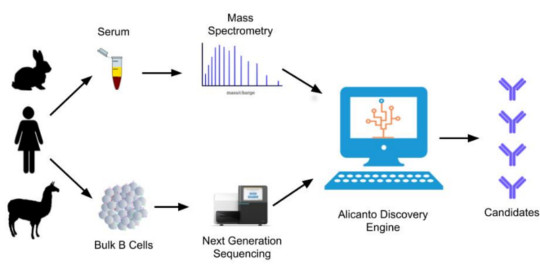Our Alicanto Approach to Antibody Discovery
Why antibody discovery from serum?
We recently launched our Alicanto® antibody discovery service. Since then we’ve fielded many inquiries about how our approach is different than traditional antibody discovery approaches. Our response is simple: we trust the immune system.
The adaptive immune system performs affinity maturation on B-cells in order to produce high affinity antibodies. These B-cells are captured by traditional approaches such as hybridoma and phage display, as well as newer approaches such as single-cell screening. Interestingly, only a subset of the target-specific B-cells found in peripheral blood are actually expressed at high levels in serum. The immune system has been evolving for over 400 million years, and it’s hard to argue with that level of experience. If the immune system has decided that the antibodies in serum are the best antibodies for the job of binding or neutralizing a target, then that is good enough for us. Alicanto® is the only commercial antibody discovery service that prioritizes the antibodies in serum.

Why rabbit?
Rabbits have a remarkable immune system that is capable of developing antibodies with superior binding. While mouse antibodies have binding affinities in the 10-100 nanomolar range, rabbit antibodies routinely reach picomolar binding. The rabbit immune system has several distinct features that enable this binding affinity.
- Mature B-cell creation happens less frequently [1]. The rabbit immune system favors re-using old clones over generating new clones. This means that on each immunization, the target-specific clones are undergoing affinity maturation, becoming higher affinity to the target.
- B-cells undergo gene conversion [2]. Gene conversion is the process of replacing whole stretches of an antibody sequence with a homologous sequence found in a different antibody gene or pseudogene. It’s a mechanism for affinity maturation that creates a ton of sequence diversity. Rabbits employ both somatic hypermutation and gene conversion.
On top of those key features, rabbits diverged from humans 90 million years ago. This translates to a stronger immune response to human protein targets.
Over the next year, we will be launching Alicanto® for antibody discovery from serum in a variety of other hosts, including llama and humans. If you’d like to understand more about the serum antibodies developed in other species, please Contact Us and let us know!
Tell Us About Your Project.
Need more information? We're here to answer any questions you have.
References
[1] Jasper, PJ, Zhai, SK, Kalis, SL, Kingzette, M, Knight, KL (2003). B lymphocyte development in rabbit: progenitor B cells and waning of B lymphopoiesis. J. Immunol., 171, 12:6372-80. (PubMed: 14662835)
[2] Lavinder, JJ, Hoi, KH, Reddy, ST, Wine, Y, Georgiou, G (2014). Systematic characterization and comparative analysis of the rabbit immunoglobulin repertoire. PLoS ONE, 9, 6:e101322. (PMC: 4076286)